Intelligence Test Practice for Army, Navy, Air Force: Verbal and Non-Verbal MCQs !
The intelligence tests for defense services like the Army, Navy, and Air Force are key to screening candidates for mental sharpness, logical reasoning, and problem-solving abilities. These tests, which often contain both verbal and non-verbal MCQs, assess a candidate’s cognitive skills and determine their suitability for demanding roles in defense. In this article, we’ll cover what to expect in these intelligence tests, how to practice effectively, and provide a downloadable PDF with sample verbal and non-verbal MCQs to help you prepare.
Understanding the Importance of Intelligence Tests for Army, Navy, and Air Force :
Intelligence tests are designed to evaluate a candidate’s ability to think critically and react quickly—skills essential in the military. These tests help assess:
- Logical Reasoning: How well candidates can approach problems logically and come to conclusions.
- Mental Alertness: Quick and accurate responses to various questions.
- Problem-Solving Skills: Ability to analyze situations and solve problems, especially in high-pressure scenarios.
Types of Questions in Military Intelligence Tests :
Military intelligence tests typically feature two main types of questions:
- Verbal MCQs: These focus on language and critical thinking skills, including comprehension, vocabulary, reasoning, and analytical abilities.
- Non-Verbal MCQs: These questions test visual and spatial reasoning skills through images, patterns, sequences, and diagrams. They require recognizing patterns and solving pictorial puzzles.
Both types of questions are equally important, and mastering them is crucial to excelling in the test.
Key Areas in Verbal Intelligence MCQs :
Verbal intelligence questions often cover:
- Analogies: Finding relationships between pairs of words.
- Series Completion: Completing sequences of words, letters, or numbers.
- Logical Reasoning: Deductive and inductive reasoning questions.
- Synonyms and Antonyms: Recognizing similar and opposite meanings.
- General Knowledge and Word Problems: Simple language-based problem-solving.
Example Verbal Question:
Q: If “APPLE” is coded as “ELPPA,” how would “BANANA” be coded?
Answer: “ANANAB”
Key Areas in Non-Verbal Intelligence MCQs :
Non-verbal questions assess how well you interpret images and patterns. Common types include:
- Pattern Recognition: Identifying repeating or symmetrical patterns.
- Series and Sequence Puzzles: Completing visual series by identifying logical progressions.
- Mirror and Water Images: Determining reflections of images.
- Analogies and Classifications: Identifying similarities or categorizing shapes.
Example Non-Verbal Question:
Q: Which image completes the sequence?
This question might show a pattern changing in steps, and candidates must identify the correct next image.
How to Practice for Army, Navy, and Air Force Intelligence Tests :
- Practice Regularly: Regular practice is essential, especially for non-verbal reasoning, which may be unfamiliar to many.
- Time Yourself: Speed is crucial, so practice completing sections within the given time to build quick thinking skills.
- Review Mistakes: Reviewing and understanding incorrect answers helps identify weak areas and improve accuracy.
- Simulate Test Conditions: Try to replicate exam conditions to get comfortable with time constraints and the testing environment.
Downloadable PDF: Verbal and Non-Verbal MCQs for Intelligence Test Practice
To help you practice effectively, we’ve compiled a PDF with sample verbal and non-verbal MCQs designed for Army, Navy, and Air Force intelligence tests. The questions cover a wide range of topics and difficulty levels, mirroring what you can expect in the actual exams.
Download Intelligence Test Practice PDF : Verbal and Non-Verbal MCQs
This PDF contains carefully selected questions across verbal and non-verbal categories, with answers included for thorough self-assessment.
Tips to Excel in Military Intelligence Tests :
- Focus on Accuracy and Speed: Intelligence tests are timed, so it’s important to balance accuracy with quick problem-solving.
- Work on Visualization Skills: Non-verbal questions require good visual interpretation. Practice visualizing patterns and shapes.
- Strengthen Vocabulary and Reasoning Skills: For verbal MCQs, a strong vocabulary and reasoning skills can help you ace the language-based questions.
- Stay Updated on Test Patterns: Each military branch may vary slightly in test structure. Check the latest guidelines to understand what’s expected.
Conclusion :
Preparation for intelligence tests in the Army, Navy, or Air Force requires dedication and consistent practice. With regular training on verbal and non-verbal MCQs, you can sharpen your skills and boost your confidence for the exam. Download the PDF provided to start practicing, and remember—preparation is the key to excelling in military intelligence tests.
Good luck with your preparations, and aim for success !
For step by step guide on how to apply for all kinds of jobs and Scholarships / Programs , visit our Youtube channel.
Additionally for more updates regarding jobs in Pakistan stay tuned with us and don’t forget to subscribe.
Click on the link below to visit our Youtube channel.
CLICK HERE
Related Job Posts :
Discover more from ZOXJOBS
Subscribe to get the latest posts sent to your email.

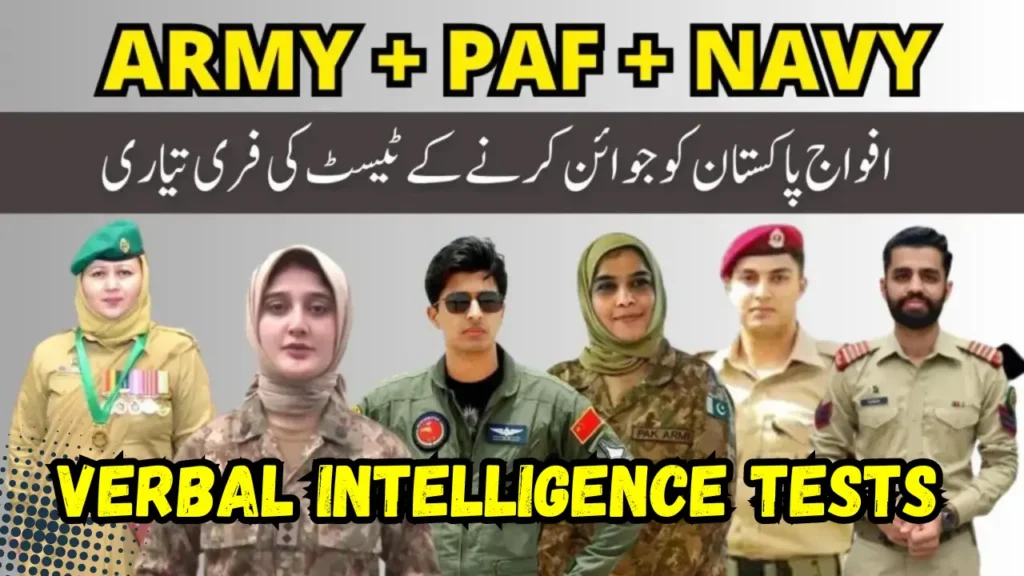





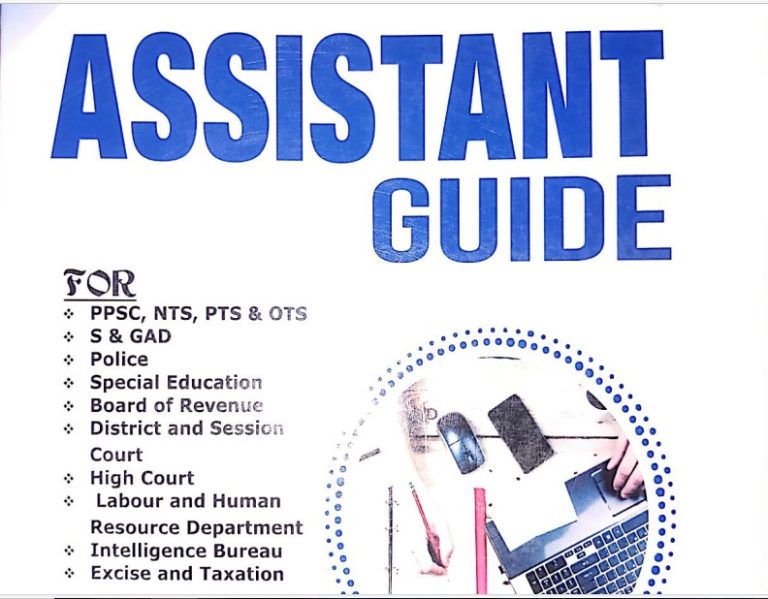
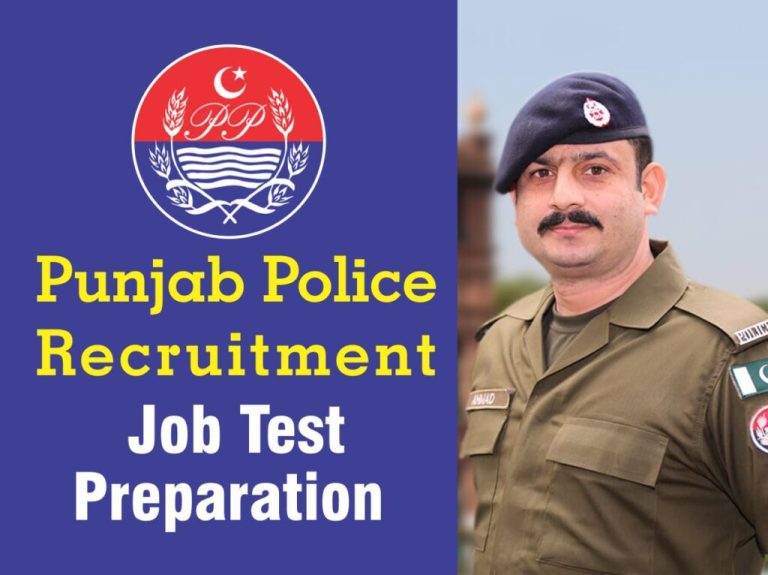
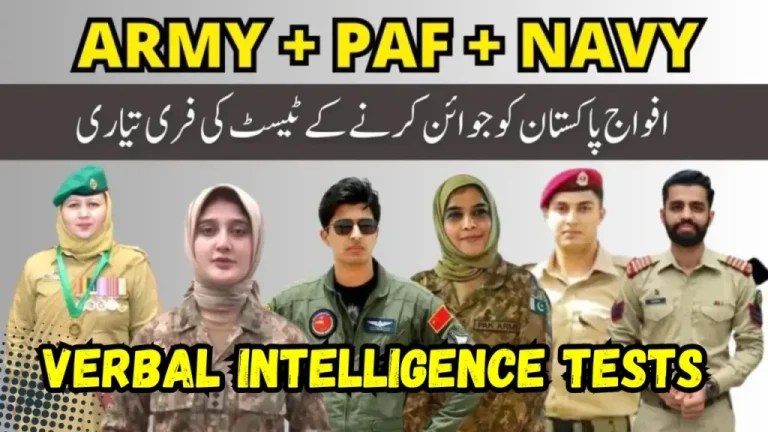
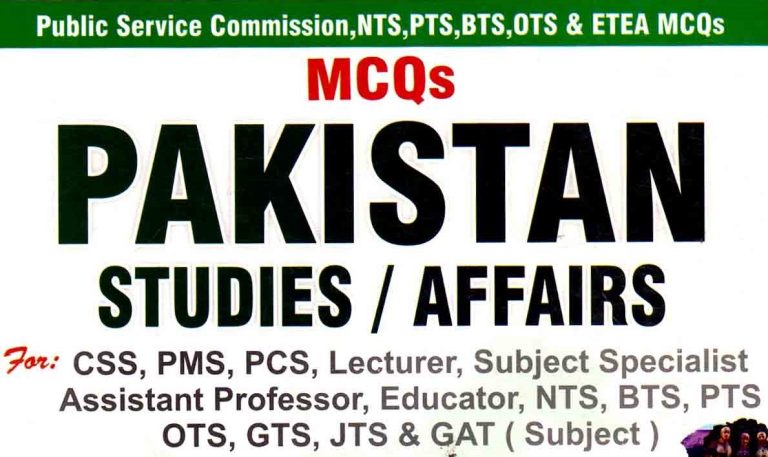

Leave a Reply